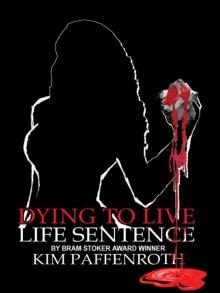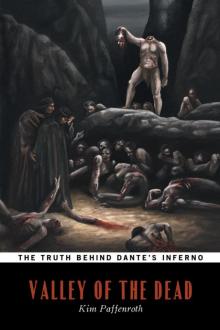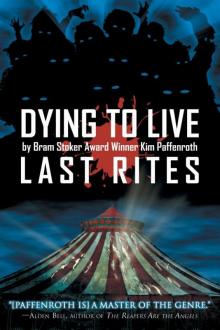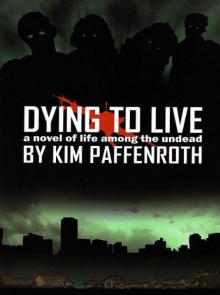- Home
- Kim Paffenroth
Dying to Live: Last Rites
Dying to Live: Last Rites Read online
Dying to Live: Last Rites
Kim Paffenroth
Published by Permuted Press.
Copyright 2011 Kim Paffenroth
www.PermutedPress.com
This book is a work of fiction. People, places, events, and situations are the product of the author’s imagination. Any resemblance to actual persons, living or dead, or historical events, is purely coincidental.
No part of this book may be reproduced, stored in a retrieval system, or transmitted by any means without the written permission of the author and publisher.
Acknowledgments
Once again, beta reading duties were ably and generously carried out by Robert Kennedy and Christine Morgan. They were joined this time by Ursula K. Raphael, who brought to the analysis an impressive knowledge of the zombie genre and its permutations. Christine was also the designated replacement writer for this volume: it is a morbid tradition of mine, to choose an author who will finish the manuscript in the event of my untimely death. Christine is an excellent writer whose lean, action-oriented style complements my rather more lumbering, embellished prose and I was thrilled she agreed, and glad she offered her help as the story progressed.
As usual, many people helped with technical questions. On firearms, the experts consulted were again Scott Field, Christopher Iwane, and Doug Wojtowicz, while Alex Parker provided details of the workings and terminology related to boats.
“…for love is strong as death, passion fierce as the grave.”
Song of Songs 8:6 (NRSV)
“Let us beware of saying that death is opposed to life. The living is only a form of what is dead, and a very rare form.”
Nietzsche, “The Gay Science,” 109
(trans. J. Nauckhoff; Cambridge, UK:
Cambridge University Press, 2001)
“The living are few, but the dead are many.”
From the story of the Buddha and Kisagotami
(R. O. Ballou, ed., The World Bible; New York:
Penguin Books, 1944; p. 143)
Chapter 1: Lucy
Lucy loved killing. It was the only thing she found exhilarating, the only thing that made her feel vital and real, as though she still mattered and wasn’t just a spectator to all the sorry, broken-down things and people—including herself—that surrounded and buffeted her every moment. Every other thing around and within her felt limp and slippery, like you couldn’t get a hold of anything and clutch it to yourself, couldn’t suck the beauty out of it till your body was filled with warmth and strength. What was that stupid saying she’d heard somewhere a long time ago? “If you love something, let it go.” What the fuck was that supposed to mean? If you loved something, you should grab it and make it yours, make it a part of you, or else squeeze yourself into it until you’re lost inside and never want to get out. If you love something it should be that kind of wet, warm, dark blanket that envelops you and carries you off to a better place, away from all the stark, glaring, worthless crap around you. Only killing did that for Lucy, really. Everything else, even if it were pleasant, dragged and enmeshed her into the endless network of a miserable, half-dead world of echoes and smoke. Killing took her out of that, above that: it was an escape, an epiphany, and she missed it badly.
Lucy hadn’t killed much since she met Truman. She thought he wouldn’t like it, and she’d respected and honored what she thought were his desires, because she was fond of him. It was Truman who had named her “Lucy,” since she didn’t remember what her name had been when she was alive, and it was useful to have something to call her. Not just useful, but downright nice, like she was more of a person now that she had a name—a pretty one, at that. Truman was good that way—he was gentle and liked pretty things, and she loved him for it, loved him in a way wholly different than she loved killing. Truman was like her music—calming and lovely, to be savored for hours and days; the only bliss she had in this existence was being with him and playing her violin.
Killing, on the other hand, was never blissful, but there was no substitute for the frenzied ecstasy Lucy felt at the solid, searing snap and tear and gush of killing. The drawback was that it wore out—it got more stale and bitter than even the ordinariness and boredom from which she wanted to escape. Lucy remembered a long time ago, long before she met Truman, she used to kill several times a day, every day—people, dogs, cats, mice, insects, anything she could catch. She was faster back then, so she could catch a lot more things. But it was too much.
It got tiresome: her muscles hurt and her head ached and she was hot and sticky all the time from the blood. There was all manner of crap wedged between her teeth and she felt bloated and stretched from the various kinds of flesh she’d eaten. But as full as she felt, she never felt satisfied, not even as she wolfed down more. She’d wallowed in the killing till it had been more like an addiction than an escape. Truman’s gentleness—along with her own weakening, uncooperative body, which was slower now and less able to catch and kill—had cured her of that, and she was grateful, even as she felt the pang of regret and longing for something so delicious.
No, killing was a lot like falling in love—it had to be done sparingly, carefully, and with the right objects. Like when she’d picked up a big rock and bashed in the head of that man who had been trying to kill Truman. Even Truman had approved of that afterward, though he seemed a little dismayed at how she’d eaten the man’s brain. What was she supposed to do? She’d earned it, and there was all that warm, beautiful pink meat there in a thick, glistening stew of blood, bone, and dirt. She really didn’t know how Truman restrained himself, let alone how he could be shocked at her indulging her urgent hunger. But never mind the eating—even Truman had said she was right to kill the man, which was the more satisfying part of the act, anyway. And oh, did that kill feel good—a fact Truman could not realize or sympathize with, but Lucy was pretty sure it didn’t diminish the rightness of what she’d done.
The first blow had shuddered up her arm with so much intensity and power it felt as if it would shock her heart into beating. The thrill had caused her to gasp unconsciously and take in a breath, which she never did, normally, and which she found exhilarating, that rush of air. She’d draw strength for weeks afterward from the memory of the look on the man’s face: it wasn’t primarily the terror—though that was almost overwhelmingly delectable at the time—but the weakness. There she was—a tiny, dead woman who could barely drag herself around without every joint and muscle aching and stiffening, her own body in constant rebellion against her—and this big, strong man with a gun was totally at her mercy. But he neither deserved her mercy, nor would she offer any—and for a moment she could see they both knew that. There was real power coursing through her body and, weeks later, reverberating in her mind. Lucy needed that kind of jolt, at least from time to time.
She heard a long moan from behind her, followed by several seconds of a dry, hacking cough. From the other side of the ship’s cabin, she heard Will say something, but his voice was low and she couldn’t make out the words. Lucy looked down at the large pot of boiling water she’d been standing by for several minutes. Sometimes she tried to measure the time by counting to herself, but she always got lost somewhere in the seventies. Even if she didn’t try to pronounce the words out loud, something in the syllables got her confused and she slipped back into the sixties and then gave up. But Truman had showed her the clock and how it moved—not showed her, really, but reminded her was more like it, though she didn’t know from when or where she remembered—and she could tell that the water had been boiling for a long time, almost five minutes. She often lost track of time like that. It was easy to do when you didn’t breathe or get hungry or sleep—there really wasn’t much to separate one min
ute from the next, or the previous.
Lucy turned off the stove and covered the pot as she heard footsteps behind her.
Truman shuffled over next to her. He looked tired, now more than usual. “Water,” he said, drawing the syllables out and not really making the “R” sound clearly. He’d gotten pretty good at speaking, though it was still an obvious effort. It was hard to take in the breath necessary to form words, then expel it just right. And any sound involving much movement of the lips—“V” or “F” sounds, for example—never came out right, since every part of Lucy and him had become so dried up and stiff. Lucy still wasn’t that good at it, but Truman continued to help her practice.
Lucy turned to the little refrigerator. She got out a plastic jug of water that she’d boiled and cooled earlier. It was one of her jobs, to keep up the supply of clean water that way. Truman was a lot smarter than she, but he wasn’t coordinated enough to do the job. He couldn’t bend his fingers enough to grab the jug, and he certainly wouldn’t be able to pour the water into it in the first place without spilling it all over. Lucy felt proud that she could do something he couldn’t, something useful. She shuffled past Truman and carried the water jug across the cabin, to where Will sat on a stool, just inside the doorway to one of the little sleeping compartments. Truman followed behind her.
Rachel lay on the bunk under a grey blanket. She and Will were different from Lucy and Truman. They were alive and could still breathe and talk and bleed. Lucy would often stare at the sweat glistening on them as they worked, hoisting the sails or doing something else on the boat the four of them lived on now. Seeing how their bodies shone at times like that, she’d think how wondrous and exciting it must be, to have so much moisture and life in you that it kept seeping out all the time, overflowing from you, and you could just make more.
Lucy would watch them, so full of life, and think how they probably screwed, too, when they went to bed and locked the door to their cabin. She had checked the door once when she was sure they were asleep; Truman had tried to stop her. She loved him, but he didn’t control her, and he should’ve known that. Besides, she wasn’t going to hurt them, and she thought Truman realized that; he probably found her curiosity rude, in a way, even if he knew she wasn’t going to do anything really bad. Lucy just wanted to know if they trusted her now. She wasn’t surprised they didn’t, and she couldn’t blame them. They were smart, and Lucy knew being smart meant being careful. Lucy wasn’t that smart, and there was plenty she had to be careful of. Besides, it seemed to her that being alive was quite a bit more difficult and dangerous than being dead, necessitating so many more precautions. There wasn’t that much for her and Truman to worry about, especially now they were far away from other people.
Lucy handed the jug to Will. “Thanks, Lucy,” he said, smiling. He and Rachel were both nice that way. Not just polite but appreciative, even respectful of her. She was glad to be with them, away from the other people with their guns and cities and various nonsensical rules, along with their sudden violent enforcement of those rules. People like that always thought everything and everyone had to be in a certain place, doing a certain thing, and if things and people went where they weren’t supposed to, then out came the guns and somebody ended up dead—not the way she and Truman were, but all the way dead. Will and Rachel weren’t like those other people, and Lucy liked them for that. She didn’t like them as much as she did Truman, of course, because he really understood and loved her in a way they couldn’t; but she liked them as much as you could someone who’s alive.
Lucy took a step back as Will wetted a cloth with the cold water and put it on Rachel’s forehead, pushing aside the girl’s thick, red hair. She’d been sick for several days and had worsened to the point where Will had anchored the boat—again, being careful to secure it a good distance from the riverbank—so he could tend to her all the time.
Seeing the usually robust, laughing girl so drained, pale, and weak made Lucy sad and anxious, for as much as she loved killing, she very much hated pain of any kind, in herself or in others. It was more than hate, really—it felt more like resentment. And it wasn’t just the discomfort of pain—that was nothing. The world didn’t owe anyone any amount of pleasure, and certainly not an endless supply of it. It was something else, something that Lucy couldn’t quite articulate in her mind, but she felt it in her stomach every time she experienced or witnessed suffering like this. Death was natural. Killing was even better than natural—it was elating and fulfilling. But pain wasn’t any of that. It just didn’t fit. It didn’t make sense. Pain wasn’t for anything, didn’t accomplish anything, so Lucy felt resentment and frustration that such a useless, ugly thing existed, especially with such abundance, frequency, and intensity. Sometimes she almost wanted there to be someone responsible for the senselessness of suffering, someone powerful and hateful she could find and hurt for what he had done. But there wasn’t such a person, she didn’t think, for everyone suffered in their various, random, disconnected ways, and no one knew why, or when it would end or start up again.
No, that was the real problem with pain, and the real source of Lucy’s confusion and anger that afternoon—that there was no one to blame for it. All she could do was stand and watch helplessly, swaying slightly with the rocking of the boat, the rhythm of which matched Rachel’s wheezing, and also lent Lucy a faint, uncertain sort of comfort.
Chapter 2: Rachel
Rachel closed her eyes and enjoyed the cold cloth on her forehead as much as she could. Her head still pounded and it felt as if acidic muck was sloshing around in her stomach, even though she hadn’t eaten in days, and hadn’t held down much of the water Will kept patiently forcing on her. He’d opened the portholes and kept the door open, except at night, but the smell of vomit and sweat had soured in the cramped space.
She rocked her head from side to side and tried to count days. If she was right, there’d be the fun of her period to deal with soon, on top of everything else. Making Will clean up her upchuck was at the limit of what Rachel thought she could stand; changing bloody sheets and dragging her to the tiny head to shower her off—that really sounded like the worst it could get. But she couldn’t move her arms or legs without the muscles and joints screaming, so she didn’t have any plans at the moment on how to avoid that indignity. She’d laugh at the ridiculous unfairness of it all, but the others would think she was going nuts, and it’d probably hurt like hell too.
Rachel rolled her head to the left and opened her eyes to look at Will. God, he was still so gorgeous—tall, big mane of blonde hair, muscled, always tanned, and with those intense but gentle blue eyes of his. She, on the other hand, must look worse than Lucy, covered as she was with all the stink and slime that was supposed to be inside her small, weak body, not oozing out everywhere all the time. Yup, being halfway to dead probably looked and felt worse than the full version. That thought really almost made her laugh out loud, but she just sighed.
Rachel looked past Will, over at Lucy. It was one of the unexpected, charming, and slightly unnerving things Rachel had discovered in their life together, that Truman always helped Lucy dress so nicely, while Rachel and Will had little concern for what they wore. They’d gone ashore a couple times as they drifted downriver, and the dead couple had seemed gladder than their living companions at the prospect of finding new clothes.
At first, it was mostly Truman’s idea to prettify his partner, but Lucy had come around quickly and then seemed to enjoy it as much as he. They were always so cute and bashful about it, dressing her at night, since they didn’t sleep. Rachel had seen how they both fumbled with things—Truman worse than Lucy, but neither with the dexterity you’d think it would take to button and unbutton clothes—so they probably needed a lot of time to accomplish it. Every few days, Rachel would see Lucy in the morning with a new dress on, and a new kerchief covering the left side of her face and head.
They were so carefully shy in their dressing and redressing that Rachel didn’t know what the
wound under the scarf looked like. Like someone had taken a bite out of the woman’s cheek? Or tore at her with their nails? Or with a weapon? Was her eye completely gone? Or was she burned? Well, it hardly mattered. It was just something you couldn’t help being curious about, even though it’s embarrassing to wonder about such things.
The rest of Lucy’s body was in pretty good shape, from what Rachel could see. She must’ve died young, with a strong, toned body, a little on the wispy side, not much in her chest or hips. And Lucy’s one good eye always overwhelmed Rachel with its beauty—such clarity, so dark blue even now, though always cold. Men must’ve loved gazing into a pair of them when she was alive. Guys liked that—the Ice Princess kind of look, bitchy and demanding, distant and unattainable. You could sure tell Truman was smitten; he stood behind her now, looking from Rachel to his beloved. Rachel smiled thinly at them, though it ached to make the effort. It was weird as hell, watching two dead people in love, but it made about as much sense as anything else in this messed-up world, and it was a good deal more peaceful and lovely than a lot of stuff Rachel had seen. So let them make death a little nicer for one another: Rachel always thought it was sweet, even if she’d shake her head at them afterward.
She turned back toward Will and took a second to refocus on him.
“How you doin’?” he asked.
“About the same.” She licked her lips. It didn’t help much, as her tongue and lips were both covered with the same gummy, sticky crap. “I kind of feel like talking. Maybe just a little.”
“Sure.” He paused, then seemed to realize what she was implying. “Oh.” Will turned toward the two in the doorway. “Um, thanks for the water, guys. You’ve been a big help. I think Rach and I will sit here for a while. Um, you know—by ourselves.”

 Life Sentence
Life Sentence Valley of the Dead (The Truth Behind Dante's Inferno)
Valley of the Dead (The Truth Behind Dante's Inferno) Dying to Live: Last Rites
Dying to Live: Last Rites Dying to Live
Dying to Live